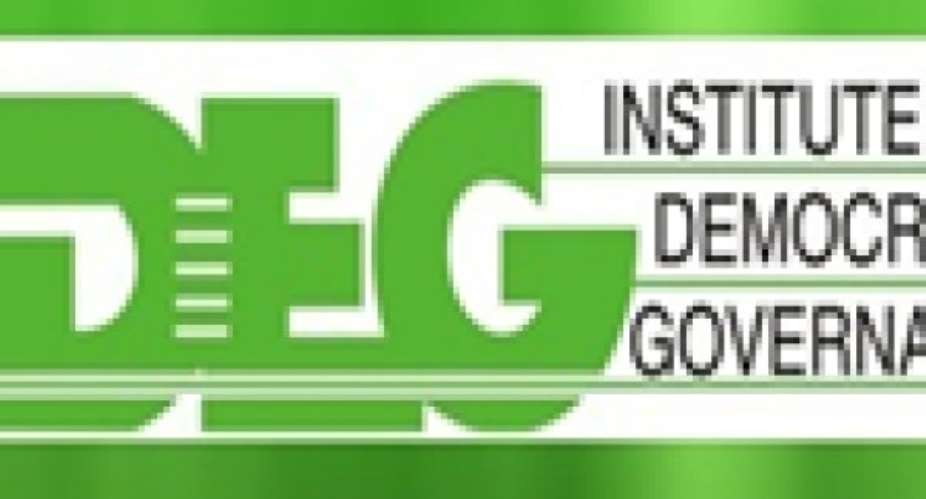As the electioneering season heats up in Ghana, it has become critical that political campaigns adhere to strict COVID-19 protocols, especially social distancing.
It is against this background that are held the Institute for Democratic Governance (IDEG) has admonished political parties to digitise their campaign activities by holding meetings virtually online.
According to IDEG, the COVID-19 conditions as they were currently will not make it possible to secure the normal space for large public party rallies and campaign gatherings
Dr Emmanuel Akwetey, IDEG Executive Director said the virtual media have now become a safer, powerful and more important medium for political party campaigns for Ghana's 2020 national elections.
He said COVID-19 has knocked out large size public campaign rallies amidst COVID-19 political parties and election candidates will now have to rely extensively on the media, both traditional and new media to carry their messages across to the voting public.
Dr Akwetey told the Ghana News Agency in an interview that IDEG has therefore created a public political education platform the webinar which is on the theme: “Using the Virtual Public Space for the 2020 Elections Campaign” to discuss the usage of the virtual space for campaign.
He explained that the main objective of the virtual forum is to promote responsible virtual election campaigning and contribute to achieving peaceful elections with credible outcomes in the face of the restrictions brought about by COVID-19.
He noted that in view of the shift in campaign focus due to COVID-19, virtual mediums such as radio, TV, webinars, and social media, although very powerful and important for the upcoming elections have some inhibitions which if not addressed could pose a threat to the country's peace and stability.
He said IDEG therefore created a platform through webinars to conduct series of engagement as more evidence has emerged on the growth and use of disruptive social forces and technology to promote impunity and undermine the integrity of parliamentary and presidential elections in the country.
He said the influx of commercial radio and television stations in the country coupled with the emergence of social media had contributed to the rise of misinformation, hate speech and negative propaganda.
Dr Akwetey noted that recent communication research had revealed that about 70 per cent of Ghanaians encountered misinformation, however, 75 per cent of Ghanaians considered misinformation to be frequent.
“Most of the negative information is usually targeted at politics and election-related activities. Currently, there are over 350 commercial radio stations and more than 30 television stations operating in Ghana separate from international media houses that broadcast through satellite and digital subscriptions.
“The danger is that a third of these media houses are owned by individuals with well-known party affiliation, therefore if unregulated, hate speech, fake news and propaganda are likely to dominate electoral campaigning on airwaves far more than in previous elections,” he noted.
He recounted that in December 2016, during the tabulation and reporting of the certified results of the presidential and parliamentary elections, the Electoral Commission complained of a cyber-attack on its database.
---GNA





 This IMANI job no dey pap; the people you are fighting for are always fighting y...
This IMANI job no dey pap; the people you are fighting for are always fighting y...
 Prof. Naana Opoku-Agyemang has changed; you can see a certain sense of urgency –...
Prof. Naana Opoku-Agyemang has changed; you can see a certain sense of urgency –...
 MFWA Executive Director slams Akoma FM for engaging in ‘irresponsible’ media pra...
MFWA Executive Director slams Akoma FM for engaging in ‘irresponsible’ media pra...
 ‘Women must become millionaires too’ — Prof Jane Naana on establishment of Women...
‘Women must become millionaires too’ — Prof Jane Naana on establishment of Women...
 Some believe only in Ghanaian votes, not Ghana — Kofi Asare jabs politicians
Some believe only in Ghanaian votes, not Ghana — Kofi Asare jabs politicians
 Plan to make BEST sole aggregator of Sentuo Oil Refinery will create market chal...
Plan to make BEST sole aggregator of Sentuo Oil Refinery will create market chal...
 2024 elections: I can't have the man I removed from office as my successor — Aku...
2024 elections: I can't have the man I removed from office as my successor — Aku...
 2024 Elections: Immediate-past NPP Germany Branch Chairman garners massive votes...
2024 Elections: Immediate-past NPP Germany Branch Chairman garners massive votes...
 Gov’t focused on making Ghana energy self-sufficient, eco-friendly – Akufo-Addo
Gov’t focused on making Ghana energy self-sufficient, eco-friendly – Akufo-Addo
 April 25: Cedi sells at GHS13.74 to $1, GHS13.14 on BoG interbank
April 25: Cedi sells at GHS13.74 to $1, GHS13.14 on BoG interbank
